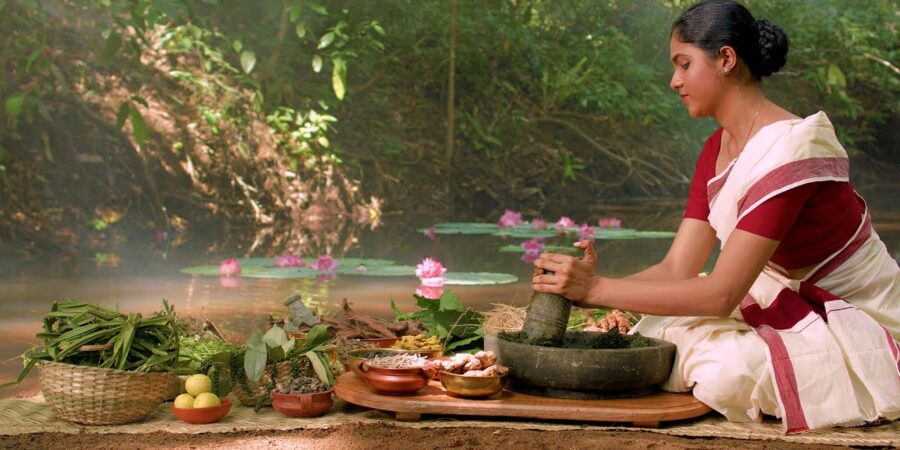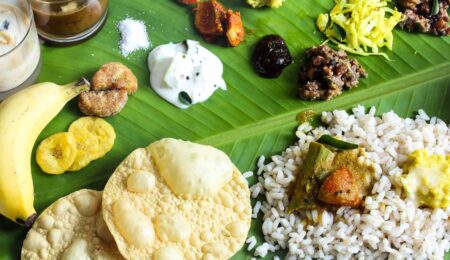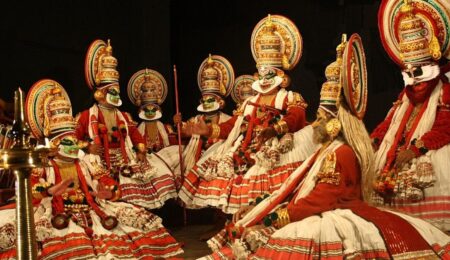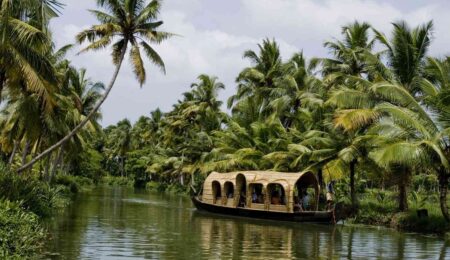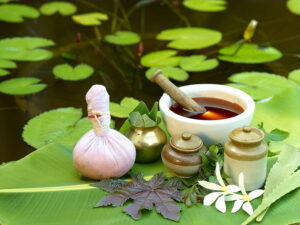 The beautiful landscapes of Kerala, a state in the southwestern region of India, are where the ancient science of life, known as Ayurveda, provides the most genuine and deep embodiment of its principles. Kerala’s Ayurvedic legacy is strongly anchored in the state’s culture, history, and the many natural resources that beautify this wonderful area. The state is located between the Arabian Sea and the Western Ghats. Located in the centre of this tropical paradise, Ayurveda is not only a medical practice; rather, it is a way of life, a comprehensive approach to health and wellness that brings harmony to the body, mind, and spirit with its holistic approach.
The beautiful landscapes of Kerala, a state in the southwestern region of India, are where the ancient science of life, known as Ayurveda, provides the most genuine and deep embodiment of its principles. Kerala’s Ayurvedic legacy is strongly anchored in the state’s culture, history, and the many natural resources that beautify this wonderful area. The state is located between the Arabian Sea and the Western Ghats. Located in the centre of this tropical paradise, Ayurveda is not only a medical practice; rather, it is a way of life, a comprehensive approach to health and wellness that brings harmony to the body, mind, and spirit with its holistic approach.
The Ayurvedic weave that has been woven throughout Kerala’s history
There is evidence that Ayurveda has been practiced in Kerala for millennia, and its history is intricately woven into the fabric of the state’s rich tapestry. There is little doubt that the ancient writings of Ayurveda, such as the Charaka Samhita and the Sushruta Samhita, have left an indelible stamp on the beliefs and practices of this area. By the time the knowledge of Ayurveda spread through the corridors of time, it discovered a fertile site in Kerala, where it took deep roots and bloomed into a distinct and renowned tradition. Kerala was the place where it found its fertile ground.
A significant contribution to the formation of the state’s Ayurvedic legacy was made by the advantageous geographical position of the state. As a result of Kerala’s closeness to trade routes, cultural interchange was fostered, which allowed Ayurveda to acquire influences from a variety of different cultures. It was through the incorporation of the knowledge of maritime merchants, ancient physicians, and indigenous healers that the Ayurvedic techniques developed throughout time. The distinctive approach to Ayurveda that Kerala has developed is the result of a conglomeration of several influences.
In Ayurveda, the Five Elements and the Doshas are considered to be the foundation.
In Ayurveda, the fundamental idea of the Pancha Mahabhutas, also known as the five elements, which are Earth, Water, Fire, Air, and Ether, represents the essence of the practice. Ayurvedic philosophy asserts that the combination of these components results in the formation of three dynamic forces that are referred to as Doshas: Vata, Pitta, and Kapha. The key to achieving and sustaining good health is to have a thorough understanding of the delicate balance and interaction between various Doshas.
Ayurvedic practitioners in Kerala approach treatment with a careful awareness of the Doshas, which are the four body types. The region’s tropical temperature, copious rainfall, and fertile soil all contribute to the availability of a large variety of therapeutic herbs and plants. Each of these plants and herbs have distinctive qualities that can either calm or exacerbate the Doshas, depending on specific circumstances. When it comes to treating diseases, Ayurvedic remedies in Kerala are designed to restore this balance by focusing on the underlying cause of the condition rather than simply soothing the symptoms.
The Expertise of Ayurvedic Medicine and Diagnosis
Ayurvedic resorts in Kerala are known for their tranquil environments, which allow for diagnosis to take place without the need of clinical testing or contemporary technology. Nadi Pariksha, also known as pulse diagnosis, is an ancient skill that is utilised by Ayurvedic physicians, who are referred to as Vaidyas. It is possible for a Vaidya to decipher the complex imbalances that exist inside the body by doing a careful examination of the pulse. This detailed approach makes it possible to provide a personalised diagnosis, which ultimately results in therapies that are properly calibrated to account for the specific characteristics of each individual.
Not only does the Vaidya monitor the patient’s bodily symptoms, but they also investigate the patient’s psychological and spiritual aspects. This is because the Vaidya has years of knowledge and wisdom that has been passed down through generations. Through the utilisation of this holistic approach, it is possible to get a thorough awareness of the individual’s health, which paves the way for a treatment plan that is both holistic and individualised.
Panchakarma, also known as the Purification Ritual
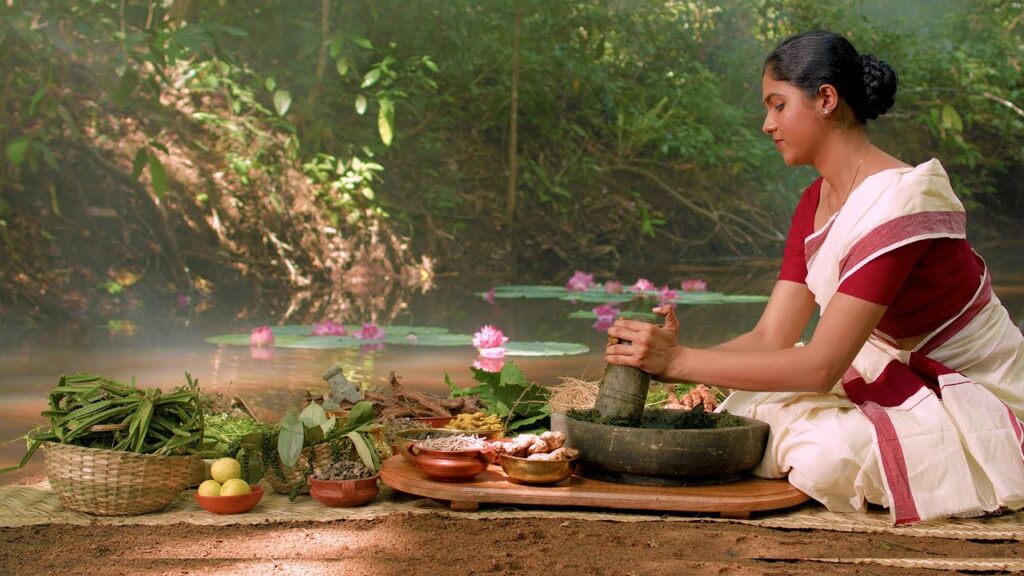 In the healing traditions of Kerala, the cleansing therapy known as Panchakarma, which is considered to be the classic Ayurvedic treatment, occupies a unique position. Through the elimination of toxins, the restoration of balance, and the rejuvenation of the body, this traditional cleansing process is devised. The state of Kerala, with its verdant landscapes and peaceful atmosphere, offers the ideal setting for the practice of Panchakarma, providing persons with the opportunity to completely submerge themselves in the therapeutic embrace of nature.
In the healing traditions of Kerala, the cleansing therapy known as Panchakarma, which is considered to be the classic Ayurvedic treatment, occupies a unique position. Through the elimination of toxins, the restoration of balance, and the rejuvenation of the body, this traditional cleansing process is devised. The state of Kerala, with its verdant landscapes and peaceful atmosphere, offers the ideal setting for the practice of Panchakarma, providing persons with the opportunity to completely submerge themselves in the therapeutic embrace of nature.
Abhyanga, also known as oil massage, Snehana, also known as oleation, Swedana, also known as sweating, and Basti, sometimes known as medicated enema, are all examples of the therapeutic treatments that are included in the Panchakarma procedure. The purpose of these treatments, which are carried out under the direction of trained therapists, is to purify the body on a cellular level by releasing accumulated impurities and revitalising the tissues.
Rejuvenation via the practice of Rasayana
An additional gem in Kerala’s Ayurvedic crown is Rasayana, which is a branch of Ayurveda that focuses on renewal and longevity. Providing nourishment to the tissues of the body, boosting energy, and fostering general well-being are the primary goals of Rasayana therapy. As a result of the amount of medicinal plants and herbs that can be found in Kerala, the state provides a wide variety of Rasayana therapies that are tailored to address a variety of health conditions and age groups.
The Rasayana experience in Kerala comprises not only a profound sense of mental and spiritual rebirth, but also a great sensation of bodily rejuvenation. An atmosphere that is conducive to holistic health is created when the serene surroundings are combined with the therapeutic touch of Ayurvedic practitioners. In the course of undergoing Rasayana, individuals not only feel a profound sense of inner balance and harmony, but they also observe a metamorphosis in their physical health.
The Mutually Beneficial Relationship Between Ayurveda and Yoga
In the state of Kerala, Ayurveda and Yoga collaborate in a fluid manner, resulting in a mutually beneficial connection that enhances the advantages of both of these ancient sciences. The practice of yoga dives into the realms of the mind and spirit, whereas Ayurveda focuses on the physical and physiological components of well-being. There is a clear demonstration of the synergy that exists between these two fields in the holistic health programmes that are provided at Ayurvedic resorts located all throughout Kerala.
The approach to health that is taken by Ayurveda is complemented by yoga, which places a focus on various postures (Asanas), breathing exercises (Pranayama), and meditation. In conjunction with one another, they produce an all-encompassing framework that takes into account the myriad of facets that comprise the human experience. Retreats that practise Ayurveda in Kerala frequently incorporate daily yoga classes into their health programmes. This allows the retreats to provide their visitors an experience that is both comprehensive and transformational.
Kerala’s Cultural Landscape: Ayurveda in Everyday Life
The practice of Ayurveda is not restricted to the confines of individual clinics and resorts in Kerala; rather, it penetrates every facet of everyday life. It is a monument to the seamless integration of this ancient science into the cultural fabric of the region that the people of the region continue to live their traditional lifestyles, which are profoundly steeped in Ayurvedic principles.
People in Kerala make decisions based on Ayurveda, which influences everything from their eating habits to their daily routines. The purpose of using spices in cooking is not limited to adding flavour; rather, each spice is selected for the medicinal benefits it possesses. ‘Sattvic’ cuisine, which is a form of Ayurvedic cookery, places an emphasis on the consumption of foods that are both healthful and nourishing, and that are in accordance with the Dosha constitution of the individual.
The Prospects for Ayurveda in Kerala in the Future
Even as Kerala continues to develop, its Ayurvedic heritage also continues to develop. As a result of the state’s transformation into a global hub for Ayurvedic tourism, wellness seekers from all over the world are drawn to the state. An entry point to the profound therapeutic potential of this ancient discipline may be found at Ayurvedic resorts and wellness centres, which are outfitted with contemporary conveniences while yet being based in ancient knowledge.
It is clear that Kerala is dedicated to maintaining and developing Ayurveda, as seen by the educational endeavours that it has undertaken. The state is home to a number of prestigious Ayurvedic colleges and research organisations, which are responsible for fostering the next generation of professors and Vaidyas. In the field of natural medicine, Ayurveda in Kerala continues to be a vibrant and ever-evolving force thanks to the synergy that exists between tradition and innovation.
In conclusion, the Ayurveda of Kerala is a tradition that is alive and breathing, and it goes beyond the bounds of mainstream medicine. It is a demonstration of the mutually beneficial interaction that exists between people and the natural world, often known as a holistic approach to health that takes into account not just the physical body but also the mind and the soul. At a time when people all around the world are looking for alternative ways to improve their health, Kerala’s Ayurvedic legacy shines as a light of old wisdom, provides a timeless road map to a life that is balanced, harmonious, and full of eternal energy.


